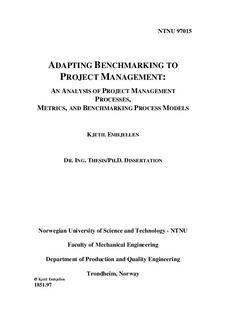Adapting benchmarking to project management : an analysis of project management processes, metrics, and benchmarking process models
Doctoral thesis, Peer reviewed
Permanent lenke
http://hdl.handle.net/11250/2437804Utgivelsesdato
1997Metadata
Vis full innførselSamlinger
Sammendrag
Since the first publication on benchmarking in 1989 by Robert C. Camp of “Benchmarking: The search for Industry Best Practices that Lead to Superior Performance”, the improvement technique benchmarking has been established as an important tool in the process focused manufacturing or production environment. The use of benchmarking has expanded to other types of industry. Benchmarking has past the doorstep and is now in early trials in the project and construction environment. Literature and current research show an increasing interest for the use of benchmarking for improvement in the project environment. However, no encountered work have done the necessary adaption of the technique from its original environment to the project and construction environment. Furthermore, no encountered work has focused on benchmarking of project management processes only. The overall purpose of this dissertation research was to better the adaption of benchmarking to the project environment with a focus on project management, so an organization or a group of organizations better can use benchmarking for improving their project management. The research effort was divided into 3 parts. The first part’s objective was to indicate strong and weak areas of project management areas or processes, in order to aid in deciding on where the improvement technique benchmarking should focus. A set of project management processes from the 1996 “A Guide to the Project Management Body of Knowledge” by the Project Management Institute (PMI) was selected for further use in the dissertation research. Since this set of processes was to be used extensively, a mail survey was conducted among experienced project management personnel to collect their subjective opinions on the set of processes. The findings from the respondents’ construction project perspectives, indicated strongly that all project management processes defined by PMI are important and none are superfluous. The findings indicated further that for some projects, the project management processes by PMI were quite complete, but not for others. In the participants’ opinion, the PMI developed project management processes illustrate quite well the project management processes on their reference projects and for constructions projects in general. It is thus reasonable to believe, that the PMI processes quite well illustrate project management processes in construction type of projects. In the same mail survey, questions were asked in order to indicate areas or processes of project management where the improvement need were highest and where improvement efforts like benchmarking should be focused. The participants were asked for their opinion of importance and performance to each of the 37 PMI project management processes. By analyzing the gap between importance and performance for each project management process, the findings includes that the project management processes performed early in the reference projects, i.e. initiating and planning processes, were identified to be of highest need of improvement. For the individual project management processes, the participants’ answers indicate that the following 12 had the highest need of improvement. In order of improvement need, the processes are: 1. Initiation 5. Staff Acquisition 9. Team Development 2. Risk Identification 6. Scope Planning 10. Schedule Development 3. Communications Planning 7. Risk Quantification 11. Quality Control 4. Organizational Planning 8. Quality Planning 12. Cost Estimating The second part of this dissertation’s research had an objective to suggest metrics for project management processes, that can be looked up and used as an aid for potential benchmarkers to define metrics for their own special project management processes. No metrics encountered in literature or existing research were developed for project management processes directly. Furthermore, no set of metrics that directly focus on project management only were encountered. Based on a combination of encountered metrics in the literature, inputs from interviews with experienced project management personnel, and creative thoughts of the author of this dissertation, this research therefore developed metrics for the 37 PMI defined project management processes. However, the suggested metrics to each project management process are not meant to be universal metrics for the project management processes in question. The lists of metrics are meant to be a place for potential benchmarkers to get ideas for their own project management processes. Thus, the metrics are not meant to be used directly, but need to be adjusted to the project management processes of the organization in question. Using the suggested lists of metrics, metrics to one project management process was tested in a survey part 2 to get some feedback on the metrics work. The process was Risk Identification. As a whole, the participants leaned clearly towards a positive opinion to the suggested metrics. The objective of the third part of the dissertation research effort, was to evaluate existing benchmarking process models’ fitness for benchmarking of project management processes, and if necessary, suggest a new model that is targeted to fit for benchmarking of project management processes. A sample of existing benchmarking process models was evaluated, in order to see if they were fit to guide in a benchmarking of project management processes. The research concludes that none of them could guide users through a complete benchmarking study of project management processes. The evaluation exercise led to an increased knowledge about what constituted strong and weak sides of such models. This knowledge was in turn applied during the design of a new benchmarking process model fit for project management processes. Applying findings from the evaluation of the existing models, the steps for a new benchmarking process was developed through a transformation process of a selected existing model. A graphical representation for the benchmarking process was developed through a combination of a creative session and studies of different categories of existing graphical representations. This research suggest a new benchmarking process model, targeted to fit benchmarking of project management processes.
Beskrivelse
Avhandling (dr.ing.) - Høgskolen i Telemark / Norges teknisk-naturvitenskapelige universitet
